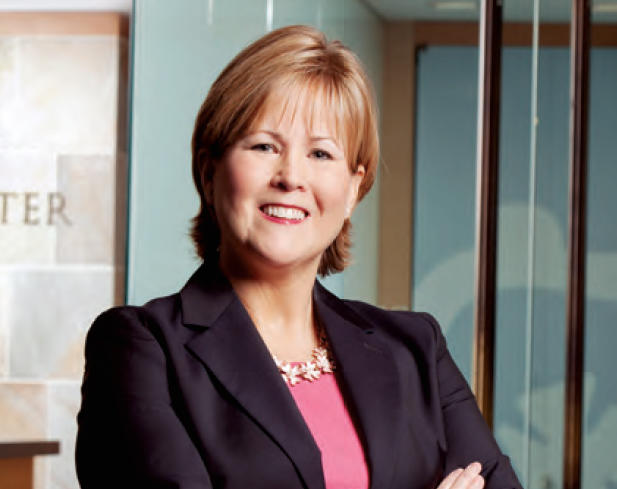Amelia J. Alverson, who has overseen the fundraising efforts of the Columbia University Medical Center for the past five years, has been chosen to lead the University’s central development and alumni-engagement operations.
Alverson was named executive vice president of University development and alumni relations in October, after filling the position on an interim basis since last spring. Her job puts her in charge of some of the University’s most visible efforts to connect with its 313,000 graduates, including the Columbia Alumni Association — a worldwide umbrella organization for all University alumni — and Columbia Magazine. She also oversees what has become one of the most successful fundraising operations in all of higher education, which in recent years has helped Columbia renew the strength of its faculty, increase the amount of financial aid available to students, and bankroll long-needed construction projects.
“Amelia has a unique ability to motivate and inspire both colleagues and volunteers to achieve exceptional results,” wrote President Lee C. Bollinger in an October 17 e-mail announcing Alverson’s appointment. “She brings to her new position great energy coupled with a strategic creativity honed by the experience of having worked effectively with the faculty, leadership, and alumni of all four schools at our Medical Center. I can think of no better person to help steward this great institution and to build upon the sense of loyalty and enthusiasm now seen throughout the extended Columbia community.”
Alverson came to Columbia in 2009 from the Stanford University Hospital and Clinics, where she was vice president for development. She previously held fundraising positions at the Mayo Clinic’s Scottsdale campus, Northwestern University’s Feinberg School of Medicine, and the University of Illinois.
When Alverson arrived at Columbia, the University was in the midst of a fundraising campaign that would become the most successful in Ivy League history, raising $6.1 billion by the time it ended in December 2013. CUMC would raise about one-third of that total, attracting $2.2 billion in gifts from alumni, friends of the University, and grateful patients and their families. Among the highlights of the CUMC campaign were the receipt of more than $100 million for a fourteen-story Medical and Graduate Education Building — which, when it opens in 2016, will represent the first major update of the medical campus’s educational infrastructure in nearly fifty years — and gifts in support of new research programs in neuroscience, genomic medicine, cardiovascular medicine, infectious diseases, systems biology, cancer, diabetes, ALS, Alzheimer’s, and many other areas.
“Supporting academics who devote their lives to helping people and improving the world is extremely rewarding to me,” says Alverson. “The reason I’ve chosen to do this at Columbia is because the University is in a period of remarkable growth and accomplishment. In the past decade, President Bollinger has articulated a bold vision for how scholars from across the institution can come together as part of large interdisciplinary initiatives that address some of the most profound challenges that we face — such as confronting climate change, harnessing genetic information to treat disease, and investigating the brain — as well as define Columbia’s increasing global presence. These are the kind of ambitious goals that have inspired alumni and others to support Columbia in record numbers over the past few years, and they are the kind of ambitions that will continue to mobilize the University community as we move forward.”
Among Alverson’s goals as executive vice president, she says, is to involve more alumni in the life of the University — not just as donors, but also as participants in regional alumni clubs and interest groups, as mentors to students, and as members of the dean’s councils and other advisory groups that help set the direction of Columbia’s schools and colleges.
“One of the reasons for Columbia’s fund-raising success in recent years is that alumni have become more deeply connected to the University,” she says. “They’re inspired by the work they see our faculty and students doing, and they want to be a part of their success.”



